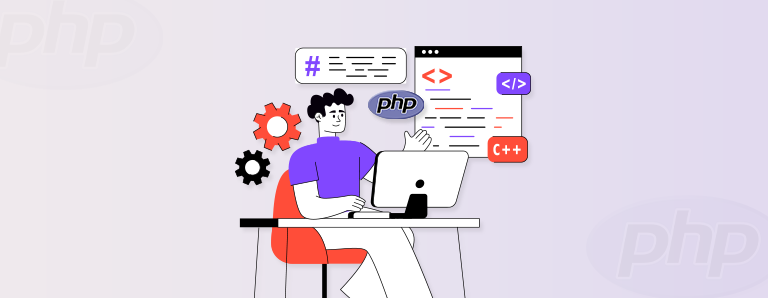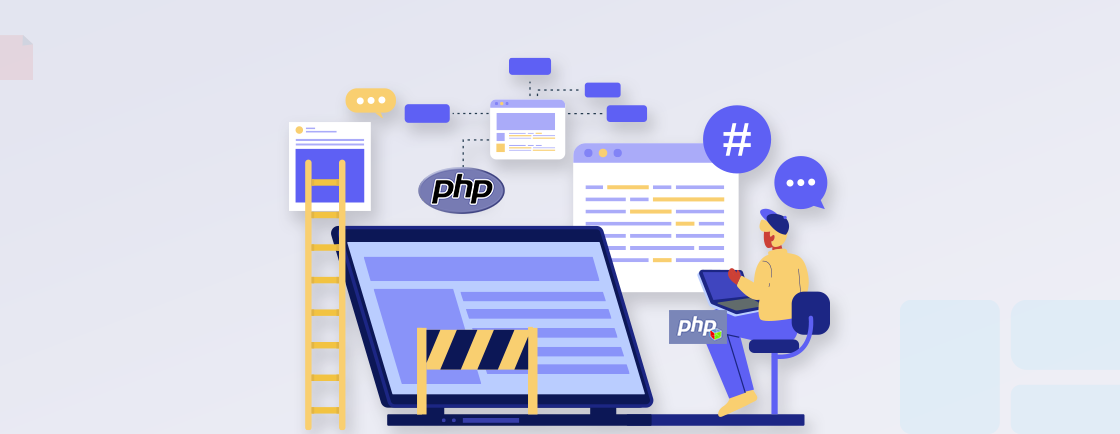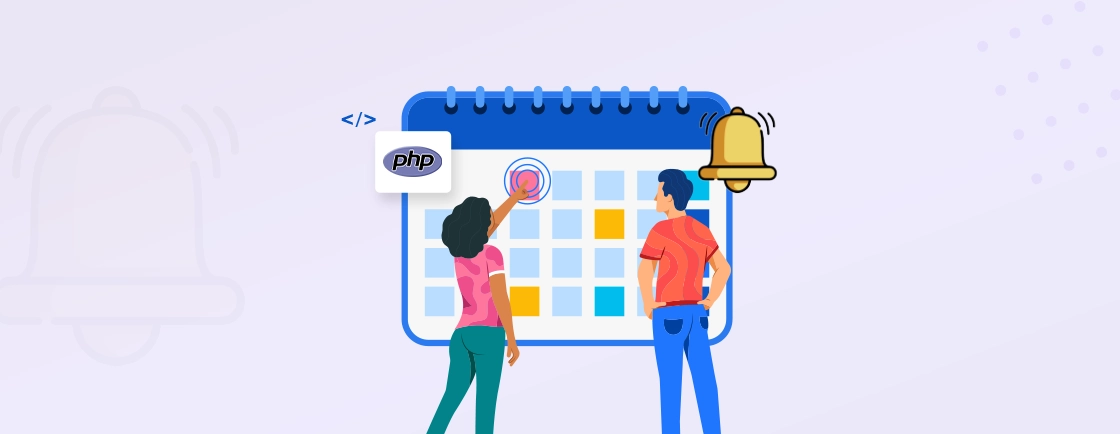Table of Contents
PHP is a ubiquitous language that can help you create some outstanding websites and web applications. Afterall, WordPress is based on it. But the PHP developers can revolutionize the website development and management process even further with the help of Machine Learning.
For the PHP developers, the machine learning frameworks act as a bridge between the familiar world of PHP and the exciting realm of AI, making PHP and artificial intelligence a practical combination rather than a theoretical concept. These frameworks make AI accessible and manageable for the developers of all skill levels. Some popular machine learning frameworks for PHP include TensorFlow, PyTorch, Keras, and more.
I’ve created this blog to help you with everything there is to know about machine learning framework for PHP developers. Let’s start with why ML could be quite important for them.
Why is Machine Learning Important for PHP Developers?
Machine learning plays a crucial role for PHP developers as it empowers them to utilize the power of data analysis, pattern recognition, and predictive modeling. By incorporating machine learning, PHP developers can enhance their web applications by incorporating intelligent features like personalized recommendations and sentiment analysis.
Enhanced User Experience
ML algorithms can analyze user data and personalize their experiences in ways that were previously impossible. For example, ML can be used to recommend products, tailor content, and even predict user behavior, leading to more engaging and interactive web applications.
Increased Efficiency and Automation
ML can automate repetitive tasks such as content moderation, data analysis, and code generation, freeing up developer time and resources for more creative and strategic endeavors. Additionally, ML-powered algorithms can optimize website performance and resource allocation, leading to increased efficiency and cost savings.
Improved Decision Making
ML algorithms can analyze large datasets and identify patterns and trends that humans might miss. This data-driven insight can empower PHP developers to make more informed decisions about their projects, leading to better outcomes and improved user satisfaction.
Competitive Advantage
By integrating ML into their projects, PHP developers can create innovative and cutting-edge web applications that stand out from the competition. ML can offer unique features and functionalities that are difficult, if not impossible, to achieve using traditional methods.
Future-Proofing Your Skills
As ML continues to evolve and permeate various industries, developers who possess the skills and knowledge to work with it will be in high demand. By learning about and integrating ML into their projects, PHP developers are future-proofing their careers and ensuring their continued relevance in the ever-changing landscape of web development.
Additionally, machine learning provides developers with the necessary tools to create adaptable and dynamic PHP websites and applications. They can adapt to changing data patterns and user behaviors, ultimately resulting in more efficient and competitive software solutions. So, if you’re ready to use the potential of machine learning in your PHP projects, hire dedicated PHP developers who can build intelligent, data-driven applications tailored to your business needs.
Best Machine Learning Frameworks for PHP Developers
Machine learning frameworks are software libraries that provide developers with the tools and functionalities necessary to build and deploy machine learning models within their applications. For PHP developers, these frameworks act as a bridge connecting the familiar world of PHP to the realm of AI.
Let’s take a look at some popular machine learning frameworks for PHP developers.
TensorFlow
A brainchild of Google, TensorFlow is an open-source machine learning framework that has revolutionized the field. Its scalability, performance, and extensive library have made it a favorite among researchers, developers, and corporations alike.
Key Features of TensorFlow
- Scalability: It can be deployed on various platforms, from single machines to large-scale distributed systems.
- Performance: TensorFlow is highly optimized for performance, making it suitable for large and complex models.
- Comprehensive library of algorithms: TensorFlow provides a wide range of algorithms for various tasks, including deep learning, linear regression, and natural language processing.
- Extensive community support: TensorFlow has a large and active community that provides documentation, tutorials, and support.
TensorFlow’s scalability and performance make it perfect for tackling large-scale problems with massive datasets and complex models. While TensorFlow’s learning curve might be steeper, its flexibility and customization options make it a powerful tool for research and development activities.
PyTorch
PyTorch, the open-source framework developed by Facebook AI Research, has rapidly gained popularity due to its dynamic computational graph and intuitive Python-based API. Its flexibility and ease of use make it a perfect choice for experimentation, prototyping, and rapid development.
Key Features of PyTorch
- Dynamic computational graph: This allows for more flexibility and easier debugging compared to TensorFlow.
- Intuitive API: PyTorch’s API is considered more beginner-friendly than TensorFlow.
- Active research community: PyTorch is actively supported by Facebook and a growing community of researchers and developers.
- Extensive documentation: PyTorch provides comprehensive documentation and tutorials.
PyTorch’s dynamic nature and interactive environment make it ideal for exploring new ideas. The PHP developers can experiment with different algorithms and rapidly prototyping machine learning models.
scikit-learn
scikit-learn is an open-source Python library that stands out for its simplicity and user-friendliness. That makes it the perfect choice for beginners and those seeking a gentle introduction to the world of machine learning.
While it primarily focuses on traditional machine learning algorithms, scikit-learn offers a robust toolkit for tackling various tasks and gaining valuable insights from your data.
Key Features of scikit-learn
- Simple and user-friendly API: scikit-learn’s API is designed to be easy to learn and use, making it a good choice for beginners.
- Extensive documentation and tutorials: scikit-learn has comprehensive documentation and tutorials that provide detailed explanations of its algorithms and functions.
- Large and active community: scikit-learn has a large and active community that provides support and helps with troubleshooting.
scikit-learn’s user-friendly interface, extensive resources, and focus on traditional machine learning make it a valuable tool for beginners and experienced users alike.
These frameworks represent only a portion of the available tools.
Benefits of Using Machine Learning Frameworks in PHP Development
From saving time to improving performance, these frameworks offer a range of advantages that can elevate your projects to the next level. Let’s see a few of these advantages:
Faster Development Time and Lower Costs
Frameworks provide pre-built components and libraries for common machine learning tasks, eliminating the need to write code from scratch. This significantly reduces development time and lowers project costs.
Many frameworks offer high-level abstractions that simplify complex machine learning concepts, allowing developers to focus on integrating them into their PHP applications without getting bogged down in low-level details.
Improved Model Performance and Scalability
Frameworks are often optimized for performance and leverage techniques like vectorization and GPU acceleration, leading to faster training and execution of machine learning models. This is crucial for dealing with large datasets and complex models.
Frameworks can be scaled efficiently to handle increasing data volumes and processing demands, ensuring your applications remain robust as your needs evolve.
Integration with Existing PHP Ecosystem
Machine learning frameworks for PHP seamlessly integrate with popular PHP libraries and tools like databases, data analysis libraries, and web frameworks like Laravel and Symfony. This allows developers to leverage their existing PHP skills and workflows for machine learning development.
This integration helps maintain consistency and reduces the need to learn entirely new tools and technologies, easing the adoption of machine learning within existing PHP projects.
Access to Large and Active Community
Popular PHP machine learning frameworks like PHP-ML and RubixML boast large and active communities of developers and researchers. This provides access to valuable resources like documentation, tutorials, code examples, and forums for troubleshooting and knowledge sharing.
Community support is crucial for developers seeking assistance with specific challenges, learning new techniques, and staying updated with the latest advancements in machine learning.
Simplified Deployment and Maintenance
Frameworks often include tools and functionalities for deploying machine learning models to production environments. This simplifies the deployment process and ensures smooth integration with existing applications.
Frameworks also provide tools for model monitoring, evaluation, and retraining, making it easier to maintain and improve your models over time.
Lower Barrier to Entry for PHP Developers
Machine learning frameworks for PHP offer a gentle entry point for PHP developers who want to explore and integrate machine learning into their applications. The intuitive APIs and readily available resources make it easier to learn and implement basic machine learning concepts.
This allows existing PHP developers to expand their skill set and build more sophisticated applications without needing to switch to entirely new languages or environments.
Challenges of Machine Learning Frameworks for PHP Developers
As with so many other technological advancements, with benefits also come the challenges. So when using the machine learning frameworks, the PHP developers may also encounter some issues, and I have listed some of them here.
Learning Curve
Compared to more established languages like Python, PHP’s machine learning ecosystem is relatively young. Frameworks might have less mature documentation, tutorials, and community resources, making them less accessible for beginners.
Developers might need to invest more time and effort in learning the framework-specific APIs, understanding machine learning concepts, and adapting their existing PHP skills to this new domain.
Compatibility with PHP
PHP’s evolving versions can introduce compatibility issues with some frameworks, requiring developers to stay updated with the latest versions and ensure compatibility with their projects.
Legacy PHP versions might not support all features and functionalities offered by newer framework versions, limiting the available options for developers working with older environments.
Limited Resources and Tutorials
Compared to Python’s extensive ecosystem of resources and tutorials, PHP’s machine learning community is still growing. This can lead to fewer available resources and learning materials, potentially hindering developers’ progress and knowledge acquisition.
Finding relevant and updated tutorials or examples for specific tasks or framework versions might be more challenging compared to other languages with more mature machine learning ecosystems.
Overall, despite these challenges, using machine learning frameworks in PHP can be a valuable option for the web development experts looking to integrate ML capabilities into their sites and apps.
How to Choose the Right Machine Learning Framework for PHP Developers?
There are several machine learning frameworks available for the PHP developers. But not all of them will be good for your requirements. The suitable one will take your development and final product to the next level.
So, here’s how you choose the right machine learning framework for PHP developers.
Consider Your Project Needs
First, you need to consider the project needs before choosing the right ML framework. You need to identify the complexity of your project. Are you building a simple application with basic machine learning tasks, or do you need a robust framework for complex models and large datasets?
Make sure you determine the specific machine learning algorithms and techniques you need to implement. That will help you narrow down frameworks offering suitable functionalities.
Do you require high-performance training and execution for your models, or is moderate performance acceptable? Consider the framework’s capabilities and potential limitations in this area.
Evaluate the Learning Curve
Next step is to analyze the options and evaluate them on the basis of different factors, and one of the significant factors is the learning curve.
Assess your existing knowledge of machine learning and PHP development. Choose a framework with a suitable learning curve based on your skillset.
Evaluate the available documentation, tutorials, and community resources for the framework. Are they sufficient to support your learning process and address potential issues?
Check for Compatibility with PHP
See if the framework supports PHP as a programming language. Choose frameworks that support current and major versions to avoid potential compatibility issues and future migration challenges.
Also, consider your server environment and its compatibility with the framework’s requirements. Some frameworks might require specific libraries or extensions to function properly.
Research Community Support and Resources
Look for a framework with a large and active community. This ensures access to valuable support resources like forums, Q&A platforms, and code examples.
Choose a framework with comprehensive and up-to-date documentation, tutorials, and learning resources to facilitate your learning process and guide your development.
To Conclude
For PHP developers looking to leverage machine learning in their applications, there are several frameworks available. Some of the popular options include TensorFlow, PyTorch, and scikit-learn.
They help integrate machine learning capabilities into your websites and web apps more efficiently. Some benefits include faster development, lower cost, improved performance, access to a large community, and more. And challenges include a steeper learning curve, compatibility with PHP, and limited resources.
If you want to unlock these benefits without the steep learning curve, partner with a PHP development company experienced in machine learning integration.
FAQs on Machine Learning Framework for PHP Developers
What is the purpose of using machine learning frameworks for PHP developers?
Machine learning frameworks for PHP developers provide a set of tools and libraries that help in building and deploying machine learning models and applications using the PHP programming language.
Are there any open-source options for machine learning frameworks for PHP developers?
Yes, there are several open-source options for machine learning frameworks for PHP developers such as Tensor Flow, scikit-learn, and PyTorch.
Can I deploy my machine learning models on production using these frameworks?
Yes, most machine learning frameworks for PHP developers allow for easy deployment of models on production servers, making it possible to integrate machine learning solutions into real-world applications.
Master PHP Web Development
Access expert guides and tips to enhance your PHP programming capabilities.





